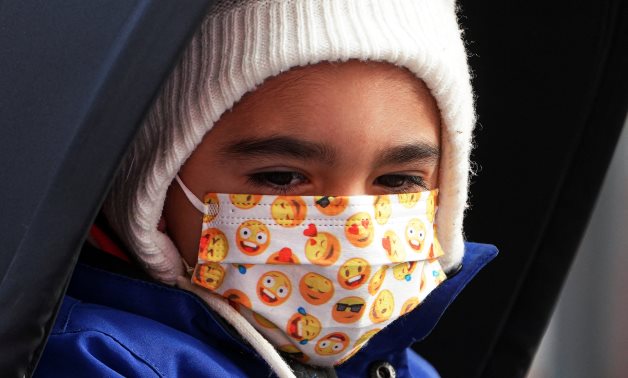
Child wearing mask - REUTERS
CAIRO - 15 December 2022: The National Vaccination Center in Vacsera of the Ministry of Health and Population confirmed that the infections of the syncytial virus are not significant, and all of them recover quickly after obtaining the specified medication according to the treatment protocol for adults and children.
Dr. Mostafa Mohammadi, Director of the National Vaccination Center in Vaxera, confirmed in statements that the syncytial virus is rapidly spreading among children, adding, "It will never reach the level of a pandemic and it has existed for many years."
Dr. Mostafa Mohammadi, Director of the National Vaccination Center in Vacsera, added that the influenza and corona vaccines do not affect at all in preventing syncytial infection, but each vaccine has a specific function for which it was created, and there are no vaccines currently registered for syncytial virus.
Muhammadi continued: There are more than 27 stations to monitor the developments and mutations of respiratory viruses at the level of the Republic, stressing that the central laboratories have advanced reagents that can identify infections related to corona, seasonal influenza, and syncytial virus. Getting into traffic.
He further added that the child is contagious with the syncytial virus the day before the symptoms appear and throughout the period of symptoms that ranges from 3 days to a week, explaining that the death rate is between 5% and 1.7%, and that the most vulnerable to death or the difficulty of the condition are children infected with risk factors such as premature babies, and children with any heart disease.
He pointed out that cases of increased sensitivity after recovery in some cases are due to the presence of a genetic history of allergy only, stressing that the syncytial virus has no vaccination because the infection and death rate is limited, and therefore syncytia is not considered a pandemic that prompted scientists to develop a vaccine or vaccination for it.
And he added that the children who are most vulnerable to infection with syncytial virus aged below two years, but this does not prevent the infection of children at a later age, explaining that the virus may infect adults over the age of 65 and those who have diseases such as: heart and diabetes.
He said that the virus spreads from autumn, the first of November until the beginning of spring, and continues until February in the whole world, not in Egypt only, indicating that the hospital receives many cases of bronchitis and pneumonia at this time, where the sensitivity and infection rate did not exceed previous years, but the precautionary measures during the Corona period contributed to reduce infections
And he stressed that no death cases were detected among those infected with the syncytial virus inside the hospital and across Egypt, noting that the death rates due to the virus are limited worldwide.
He added: Not all cases infected with the syncytial virus need to be hospitalized.
Hossam Hosni, head of the Corona Scientific Committee at the Ministry of Health and Population, explained the symptoms of respiratory diseases in children such as syncytial virus, are: difficulty breathing, fever, runny nose, vomiting, and sore throat, stressing that a specialist doctor should be visited when any of the symptoms appear. These symptoms require the child to receive appropriate care and treatment.
And he stressed that there is no antibiotic to treat this disease because it is viral and not bacterial, and there is no vaccine for it yet, due to the periodic change in the virus’s proteins, but there is a treatment that is given to children at a young age, stressing that the most important methods of treating minor symptoms are home comfort, and the use of fever reducers with the doctor's instructions, warning against the wrong use of antibiotics in such pathological conditions.
Comments
Leave a Comment